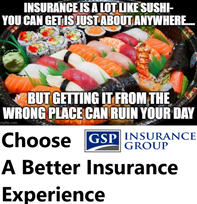GSP Insurance Group Blog |
What Are Some Common Reasons for Non-Renewal?Is your homeowners' insurance policy at risk for non-renewal? This can happen for a variety of reasons, and it's crucial to be aware of them so you can take timely action. This has become a frequent occurrence, not only in Beaufort County and South Carolina but across the country, as insurance carriers are pulling back from disaster-prone areas, particularly coastal regions. Other companies are reorganizing or even liquidating, adding to the trend of non-renewals.
A failed home inspection is a common reason for non-renewal. If your property doesn't meet the insurance company's safety standards due to issues like faulty wiring or an aging roof, you might receive a non-renewal notice. Residing in areas at high risk for natural disasters is another significant factor. Insurance companies are increasingly cautious about providing coverage in zip codes prone to frequent natural disaster-related claims, such as hurricanes, earthquakes, or wildfires. Fraudulent information on the application can also result in non-renewal. If material misrepresentations or false details are discovered, the insurer has the option to either cancel or non-renew the policy. Understanding your policy's terms and conditions is essential to avoid such situations. Should you receive a non-renewal notice, consider reaching out to an independent agent who can help you find a suitable new insurance provider. By maintaining a clean claims history and ensuring that your property is in good condition, you can bolster your chances of policy retention. Stay informed and proactive to secure the coverage you need.
0 Comments
 Introduction As a landlord, it is essential to protect your investment and ensure the well-being of your tenants. One way to achieve this is by requiring tenants to have renters' insurance. Renters' insurance provides coverage for tenants' personal belongings and offers liability protection. In this article, we will discuss the requirements that landlords should have for tenants' renters' insurance policies, emphasizing what that means for landlords and property owners in Georgia and South Carolina.  Introduction South Carolina, a state known for its picturesque landscapes and welcoming communities, is currently facing unprecedented challenges in the home and auto insurance market. Within this vibrant state, Beaufort County has emerged as a battleground where residents are grappling with the impact of rising insurance rates. Across the board, homeowners and drivers are witnessing an alarming increase in premiums. Additionally, the market is witnessing a growing trend of carriers either withdrawing altogether or implementing stricter underwriting guidelines and higher down payment requirements. This phenomenon has earned the title of the "hardest insurance market" in a generation across the country. In this blog article, we will delve into the state of the home and auto insurance market in Beaufort County, explore the factors contributing to the difficulties, and provide insights on how to navigate this challenging landscape.  An attractive nuisance is a term used in insurance and legal circles to describe a dangerous condition on a property that may attract children and cause harm or injury. This could be anything from a swimming pool or trampoline to a construction site or abandoned building. In this blog post, we will take a closer look at what an attractive nuisance is, why it matters in insurance, and how property owners can protect themselves.  Insurance is an important aspect of life that helps protect us from financial losses due to unforeseen circumstances. When it comes to home and auto insurance, your insurance score plays a significant role in determining your insurance rates. In this article, we will discuss what an insurance score is and how it affects your home and auto insurance rates.  I find myself answering this question several times a week to explain to clients and prospects the difference between Admitted & Non-Admitted Insurance Carriers. In the world of insurance, there are two types of carriers: admitted and non-admitted. Both are important players in the insurance market, but they differ in several significant ways. In this blog post, we will explore the differences between admitted and non-admitted insurance carriers and their importance in the insurance industry.  South Carolina's beautiful coastal region has always been a prime location for homeowners looking to enjoy the stunning beaches and year-round sunny weather. However, this picturesque region has faced its share of natural disasters, including hurricanes, flooding, and severe storms, leading to a significant impact on the coastal home insurance market. Over the past few years, South Carolina's coastal insurance market has undergone some significant changes. Let's take a closer look at the current state of the coastal home insurance market in South Carolina. Home insurance is a necessary expense for any homeowner, as it provides protection for your home and personal belongings in the event of damage or loss. The cost of home insurance can vary depending on several factors, including the location and age of your home, as well as the amount of coverage you need.
One of the most crucial factors that determines the cost of home insurance is the location of your home. Homes located in areas prone to natural disasters, such as hurricanes or earthquakes, will typically have higher insurance rates than homes in more stable areas. Additionally, older homes may also have higher insurance rates, as they may be more susceptible to damage or wear and tear. Homeowners insurance is a type of insurance that provides protection for your home and personal property in the event of damage or loss from certain perils, such as fire, windstorm, and theft. It also provides liability coverage in the event that someone is injured on your property and sues you.
When you're looking for home insurance, it's important to understand that there are different types of coverage available, such as dwelling coverage, which covers the structure of your home, and personal property coverage, which covers your personal possessions. You should also consider additional coverage options, such as flood insurance or umbrella insurance, depending on your specific needs and the risks in your area. If you live in a home or condo located in an HOA, loss assessment coverage is an optional add-on that covers you for the portion of damage to common areas you’re responsible for.
If you live in a shared community that has a condo or homeowners association (HOA), damage to shared spaces like the building, clubhouse, or pool area is covered by your HOA’s master policy, which is paid for by membership dues. That means if a shared space is damaged or a guest has an accident in a common area, your community’s HOA insurance will cover the loss up to its coverage limits. If the claim amount exceeds those limits, HOA bylaws usually require members to pay an equal share of the leftover loss amount. A loss assessment coverage endorsement is designed to cover these leftover costs so that you don’t have to foot the bill entirely out of your own pocket. You can easily add this endorsement to your condo or homeowners insurance policy. |
Contact Us(843) 707-4473 Archives
February 2024
Categories
All
|


 RSS Feed
RSS Feed